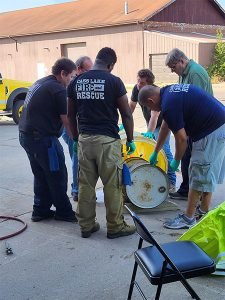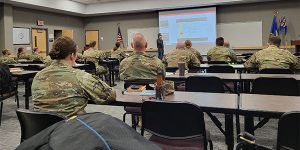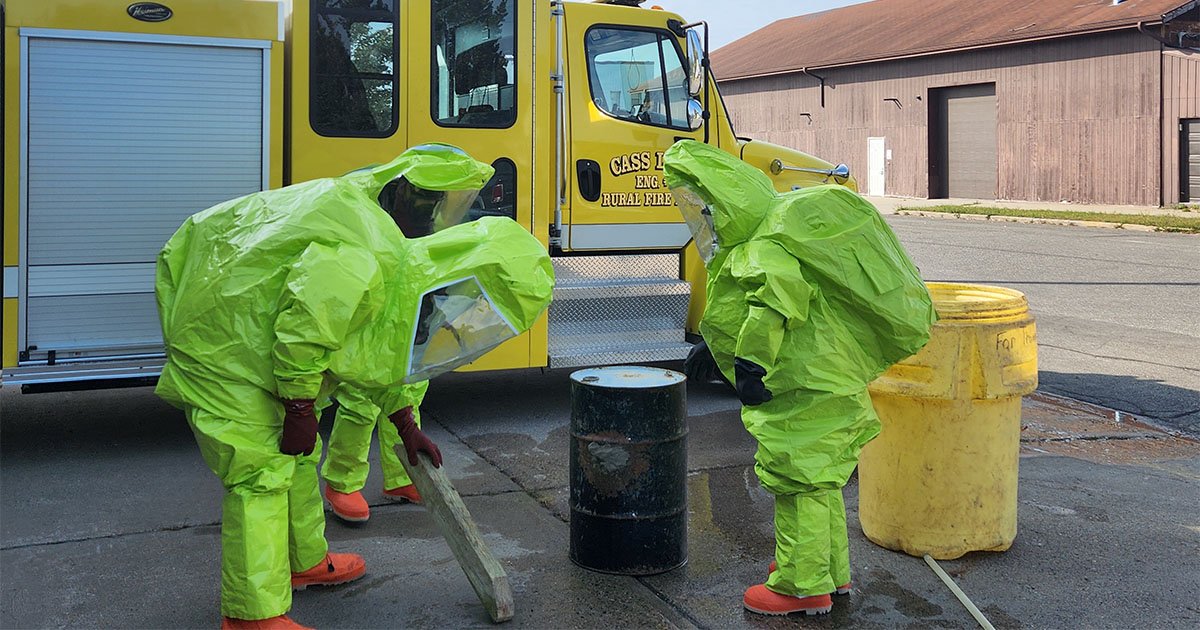If you visit the University of Minnesota Twin Cities campus this fall, don’t be alarmed if you see people in full head-to-toe, chemical-resistant suits transferring old dilapidated barrels of what looks like hazardous chemicals into large, 55-gallon drums.
Though it may look startling, it’s just another day of hands-on training at the UMN Hazmat Training Program, a partner within the larger Midwest Consortium for Hazardous Waste Worker Training (MWC). The UMN Hazmat program has been housed within the School of Public Health (SPH) for more than 25 years. Since its founding in 1987, the MWC has trained hundreds of thousands of people in hazardous waste cleanup, response and abatement — including waste site workers, engineers, industrial hygienists, emergency management professionals, police officers, firefighters, paramedics, and other health and safety professionals. The UMN center provides over 50 training sessions per year regionally to about 500 people completing continuing education training through their program. Programs are offered in multiple languages and community settings.

And that training exercise with the barrels? It’s called “barrel overpacking,” explained Lois Harrison, UMN Program Director, who has been part of MWC since 2001. It’s a common technique used by hazardous materials responders in order to transfer a compromised barrel of chemicals into a new, secure container. “The drums can be extremely heavy and unwieldy, and the full ‘moon suits’ (chemical protective clothing) that our students wear, heat up quickly. That’s why we don’t do that particular training session in the summer,” she explained. The training exercise also reflects the MWC’s commitment to “learning by doing,” something program graduates say helps them as they transition into the workforce and confront real-world situations.
As its name suggests, the proper treatment, handling, and abatement of hazardous waste materials was central to MWC’s founding. With international attention focused on catastrophes like the Love Canal toxic waste site in New York and the deadly chemical gas leak in Bhopal, India, Congress approved funding via the National Institute of Environmental Health Sciences (NIEHS) to establish the consortium at 13 training centers throughout the Midwest.
To this day, MWC’s focus on training people who directly handle and clean up hazardous chemicals remains core to its work. And that work is more relevant than ever given recent news reports that chemical spills happen more than once every two days in the US. But as climate change and other factors emerge as public health threats, MWC’s mission is also evolving.
“That focus on chemical spills and cleanup remains the bread and butter of our work, but over the years, we’ve also expanded into many other areas,” explained SPH Professor Peter Raynor, who is MWC’s principal investigator. “People might not associate pervasive mold, for example, as a hazardous materials issue, but as climate change continues to drive major flood events, more and more areas of the country are dealing with water infiltration that can lead to hazardous mold growth in their homes and businesses. These moldy structures and furnishings directly impact public health.”

This year alone, areas of the country from Maine to Kentucky have been ravaged by unprecedented flood events. To assist community residents to both prepare for possible flood events and remediate mold in buildings affected by floodwaters, MWC has developed training sessions focused specifically on mold remediation and response.
Ms. Harrison also said that, for many people, the training sessions have been a gateway to a career in public health. “People attend a training and a light bulb goes off; they think, I really want to pursue this as a career,” she reflected. A current student in SPH’s Occupational Hygiene program, for example, learned about SPH after taking MWC’s hazardous materials training course a couple of years ago. “We see our program and the work of the consortium as one of the public-facing elements of the school helping to bring new people into the public health workforce,” Harrison said.
From a warming planet to an ever-increasing reliance on hazardous chemicals, the threats to our public health continue to grow and evolve. And as they do, MWC will continue its efforts to train people to meet the needs of an increasingly complex public health environment.

